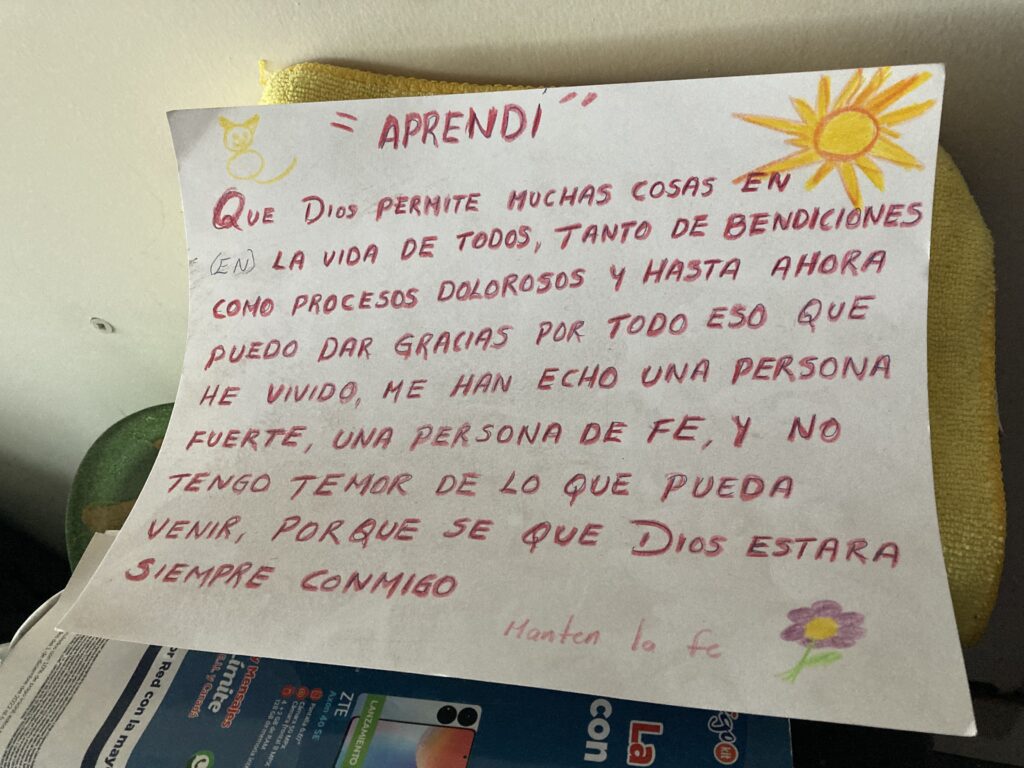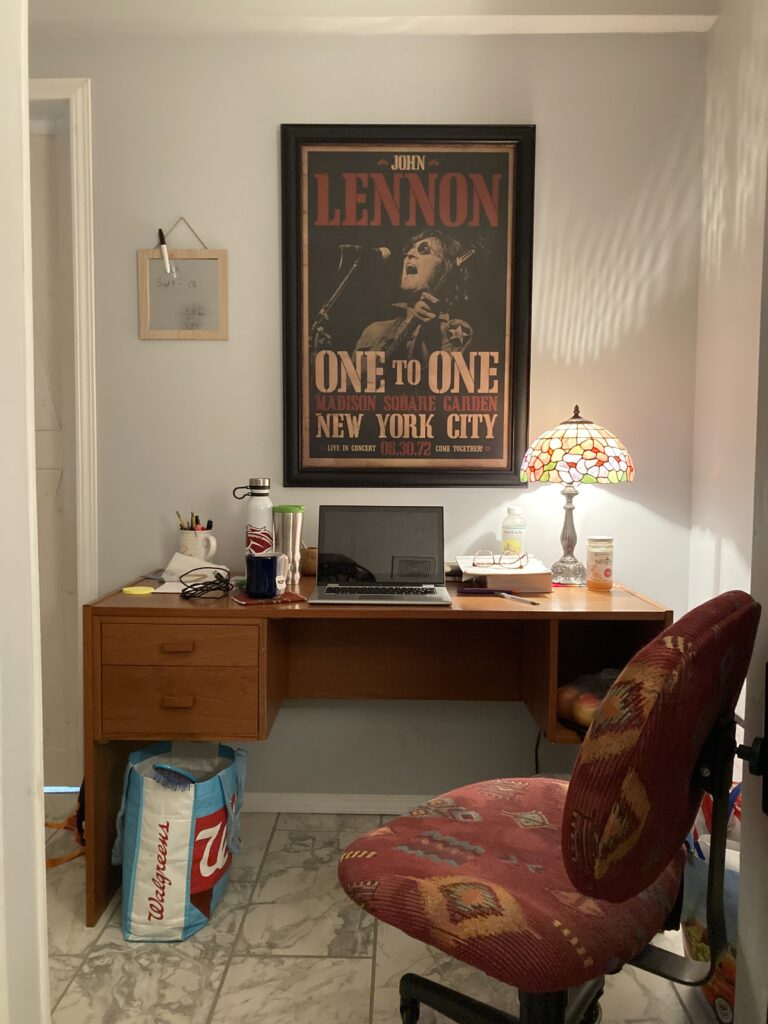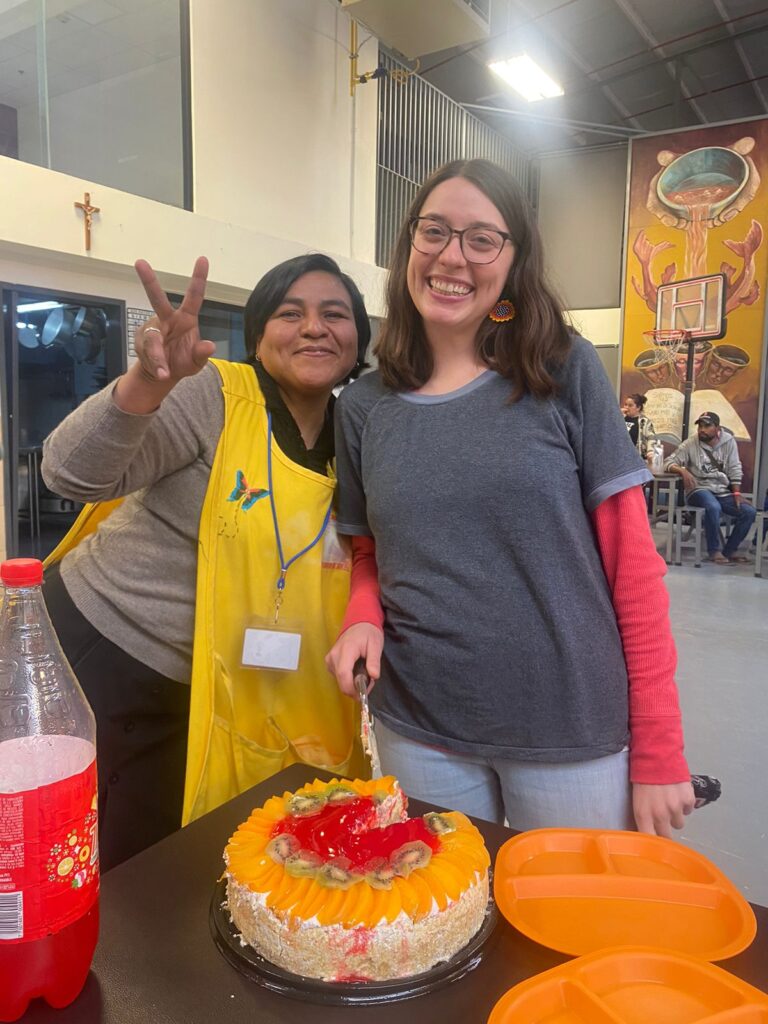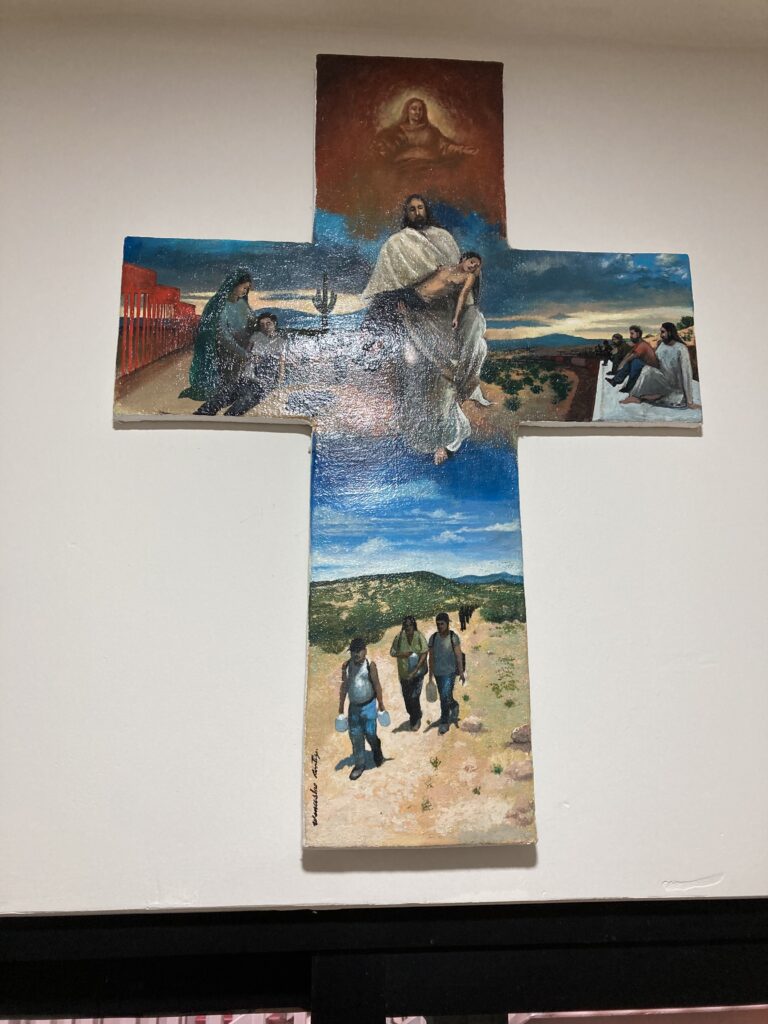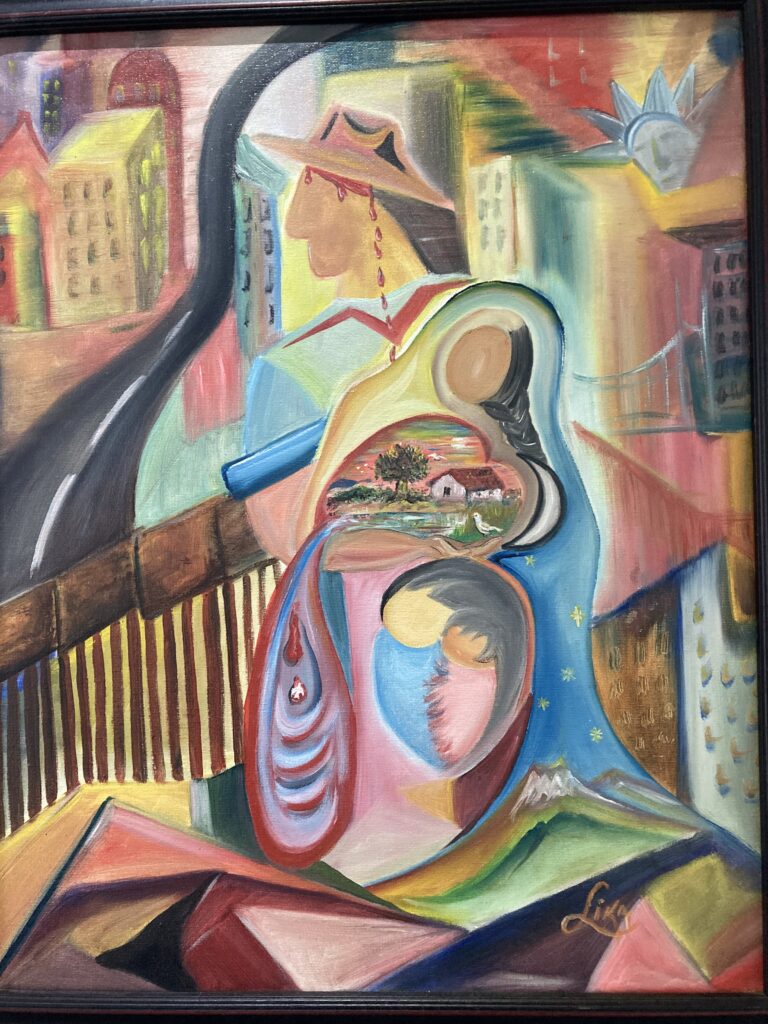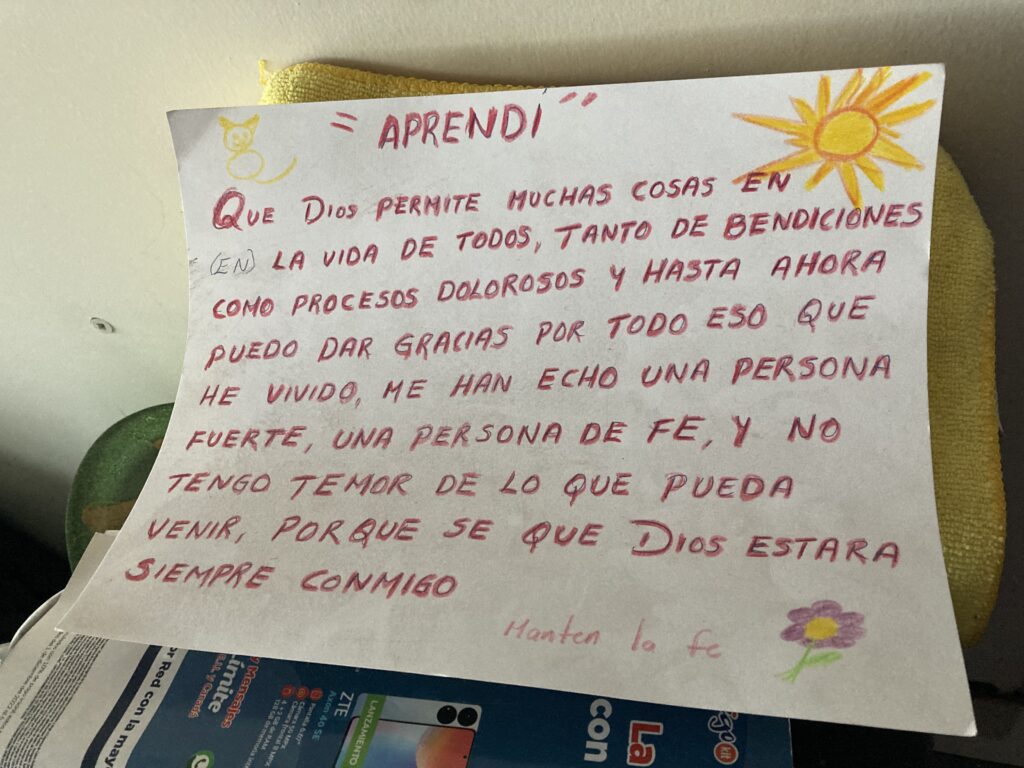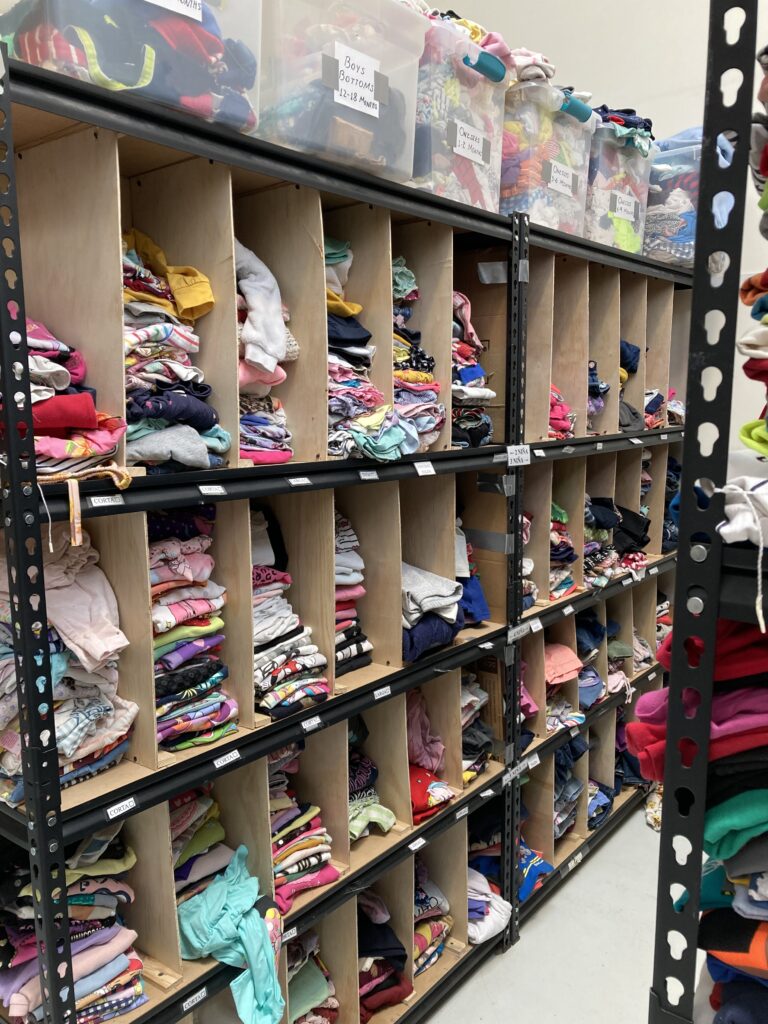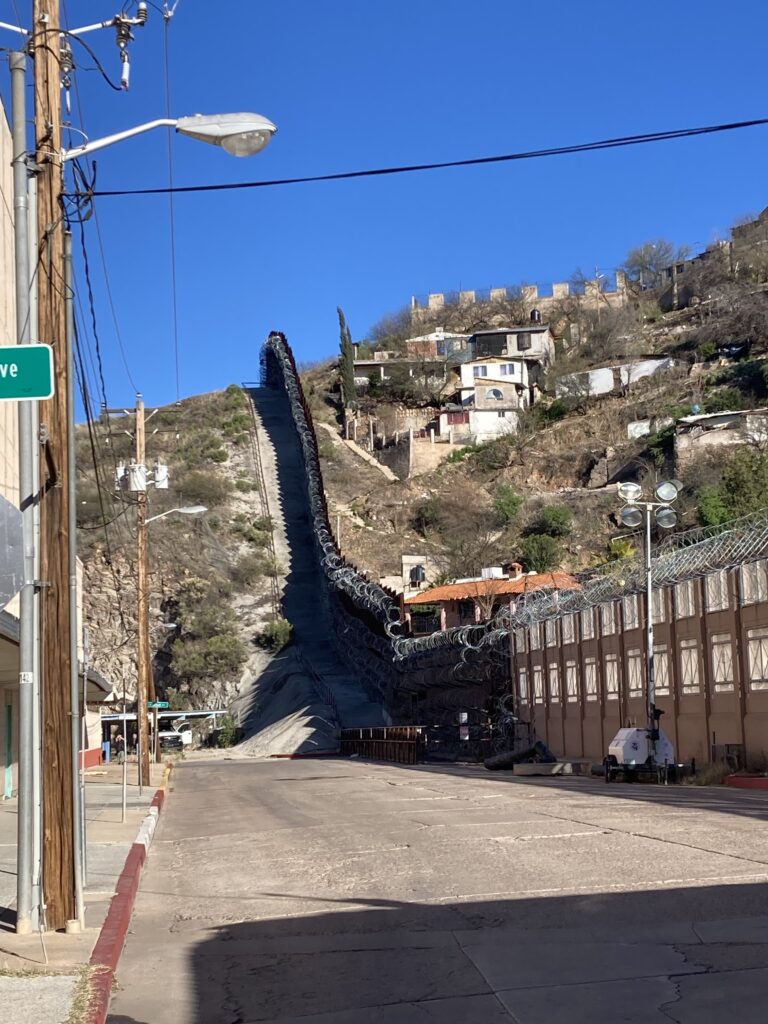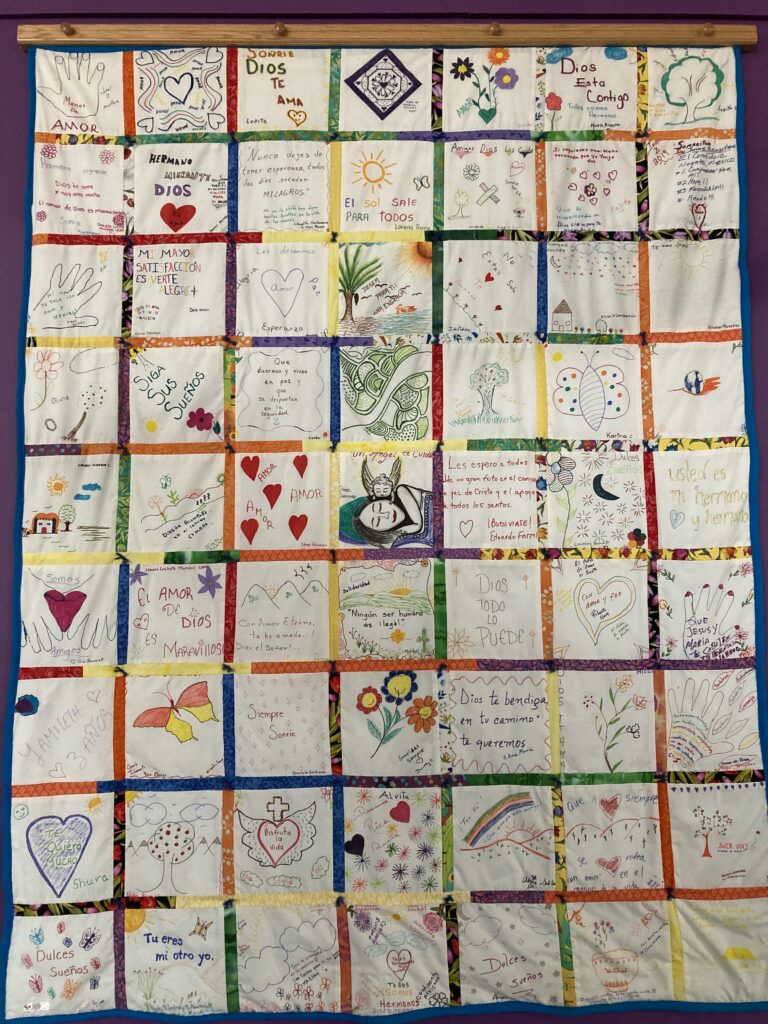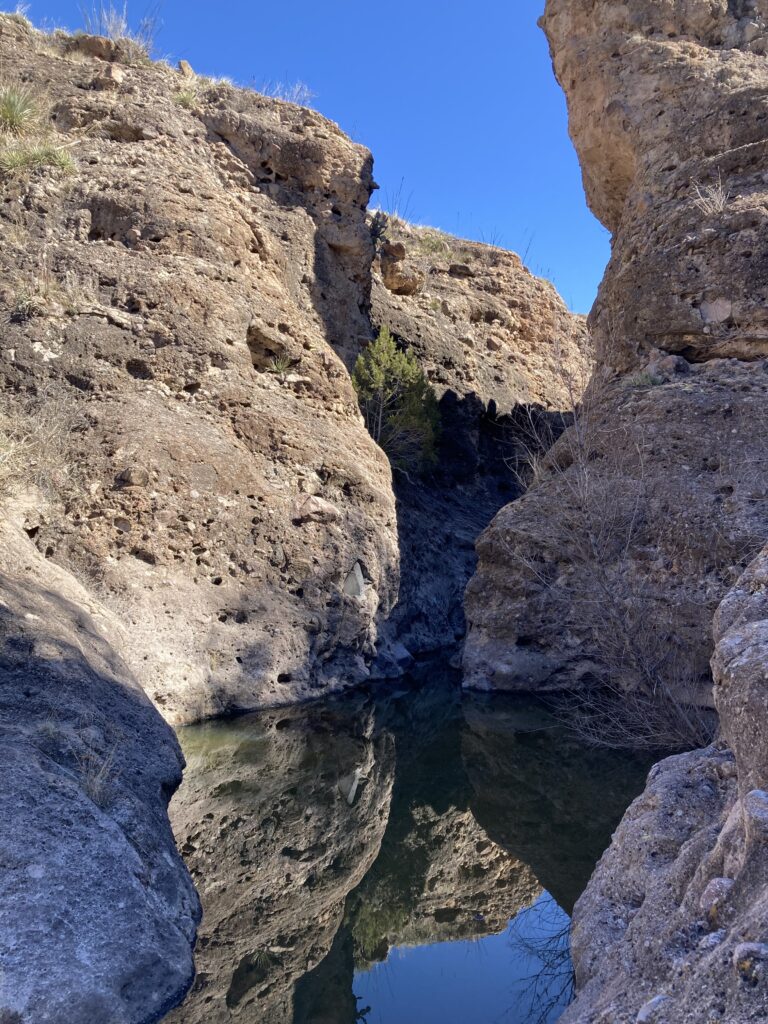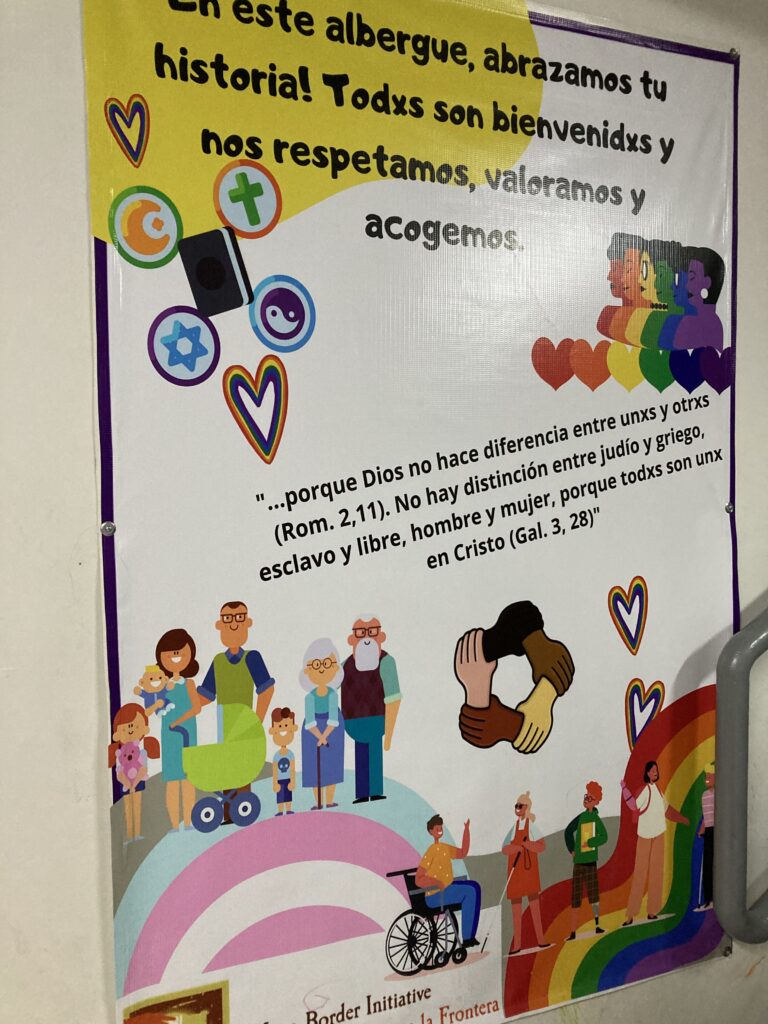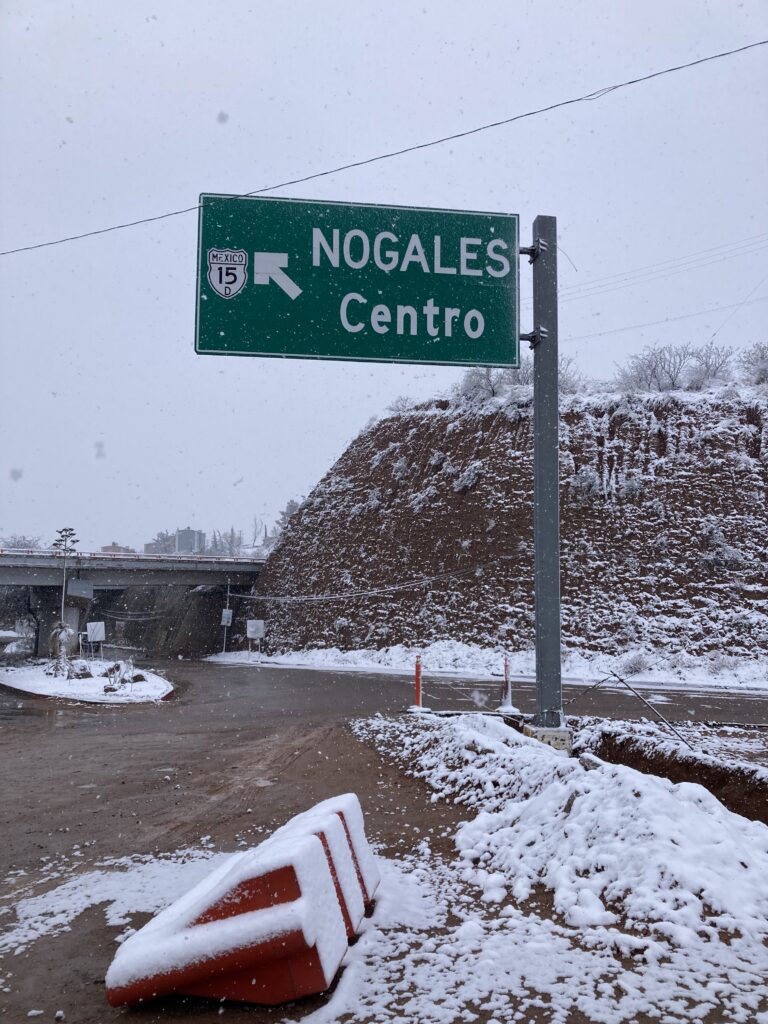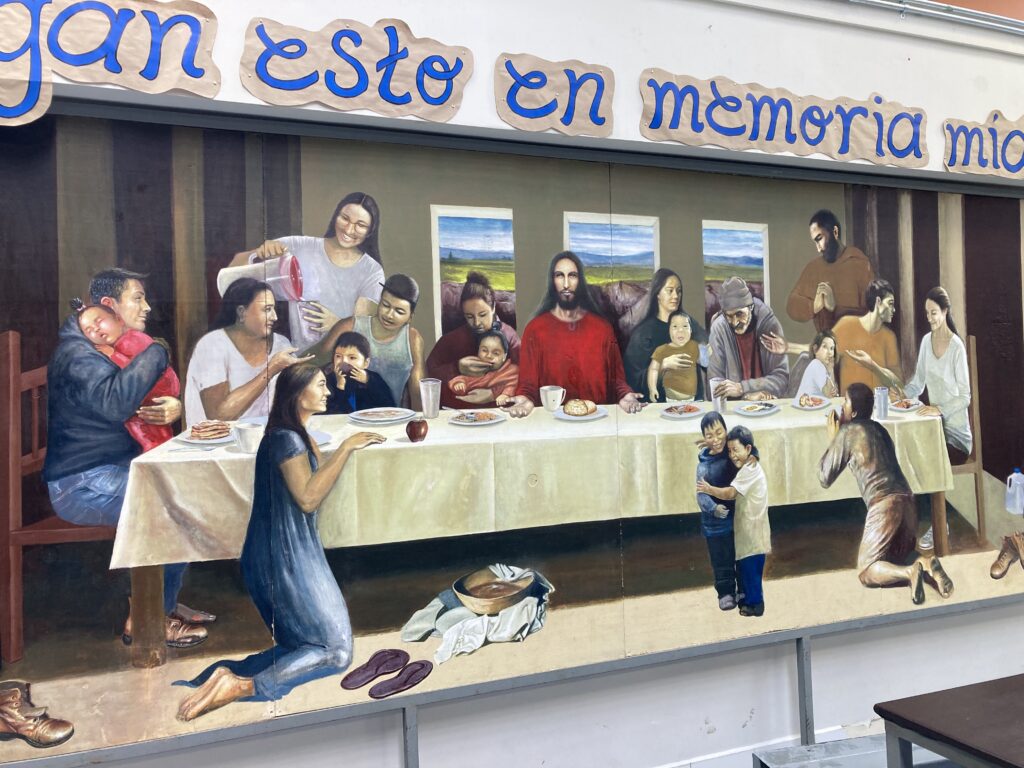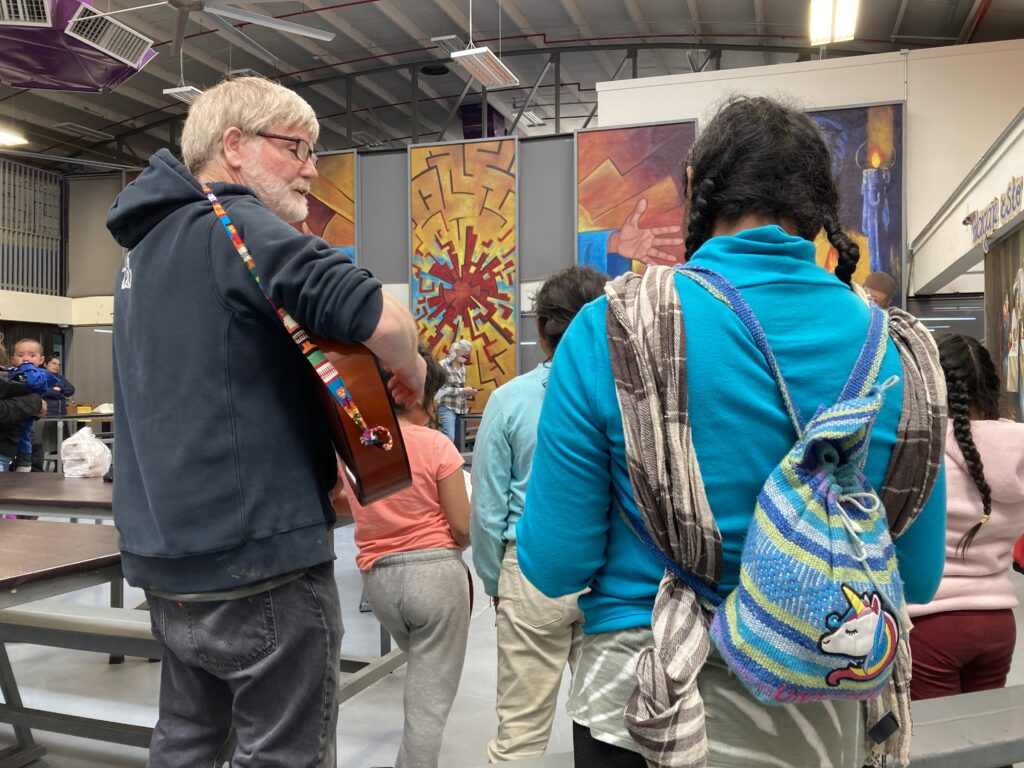11 marzo 2023
¡Hola después de dos meses de mi peregrinaje a lo largo de esta frontera tan tumultuosa y llena de noticias! Actualmente estoy sentada en un escritorio en una habitación que me prestaron por un mes en la casa Marist-Maryknoll en El Paso, Texas. Hay una hermosa lámpara de cristal de colores a mi derecha que ilumina el espacio sin ventanas, y estoy comiendo una barra de coco teñida con los colores de la bandera mexicana. Esta mañana me siento ligera, me siento inspirada, me siento esperanzada.
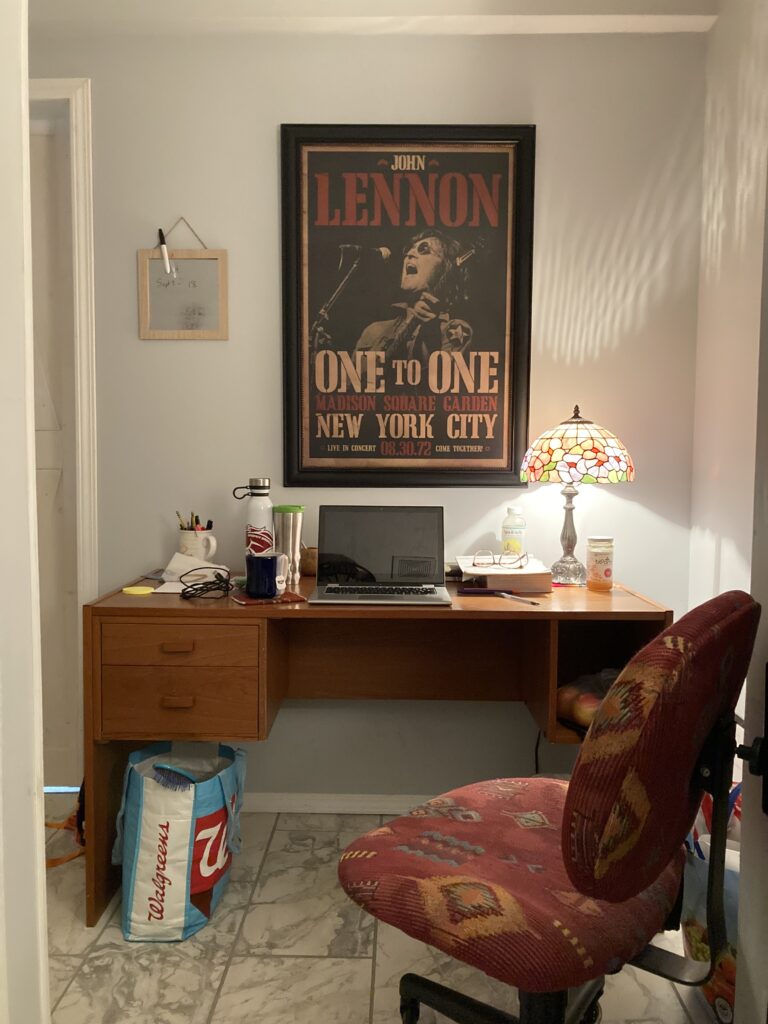
La bendición de este capítulo (en El Paso) es la oportunidad de tomar una pausa más grande y procesar de donde vengo. Hay días en los que me siento desconectada y sin rumbo (seguramente, más días de los que desearía que fueran así) y puedo caer en la duda. Esa experiencia tiende a resonar para mí independientemente de dónde esté o de lo que esté haciendo. Al crecer, mi madre lo llamó estar “en un funk”.
Pero luego hay otros días en los que escucho música de películas que nunca he visto (actualmente escucho “Half Brothers” de Jordan Seigel) y sonrío al cielo y me siento inspirada, abrumada con convicción y gratitud más allá de las palabras. A veces es difícil transformar esos momentos en la acción que busco. Estoy dedicando este tiempo a cultivar esa convicción e inspiración en lugar de tratar de transformarla tan rápido. Llegará el momento de eso, estoy segura.
Los pocos días que pasé en la Iniciativa Kino para la Frontera fueron informativos y hermosos. Aunque tuve algunos días desafiantes, atesoro las pequeñas interacciones de la comunidad que compartí con el personal y los voluntarios a quienes reporté. Escuché las noticias de NPR muchas mañanas mientras conducía con las hermanas Tracey y Marilu. Me sentí tiernamente vista y cuidada por la Hermana Nancy. Compartí una comida con algunas voluntarias y Misioneras de la Eucaristía (¡completa con tequila y salsa casera de habanero!) con muchas risas y lamentos. Compartí conversaciones profundas y leí las reflexiones del padre de mi ex compañera de coro de Seattle U.
Admiro los esfuerzos de la organización para animar y apoyar a la comunidad de voluntarios/personal; a pesar de que solo ofrecí 9 días de obra, me celebraron con un hermoso pastel de tres leches en mi último día y una tarjeta firmada con dulces mensajes. Muchos miembros del personal repitieron que esperaban que yo regresara algún día (¡y casada! ¡Con mi cónyuge!) en un futuro no muy lejano.
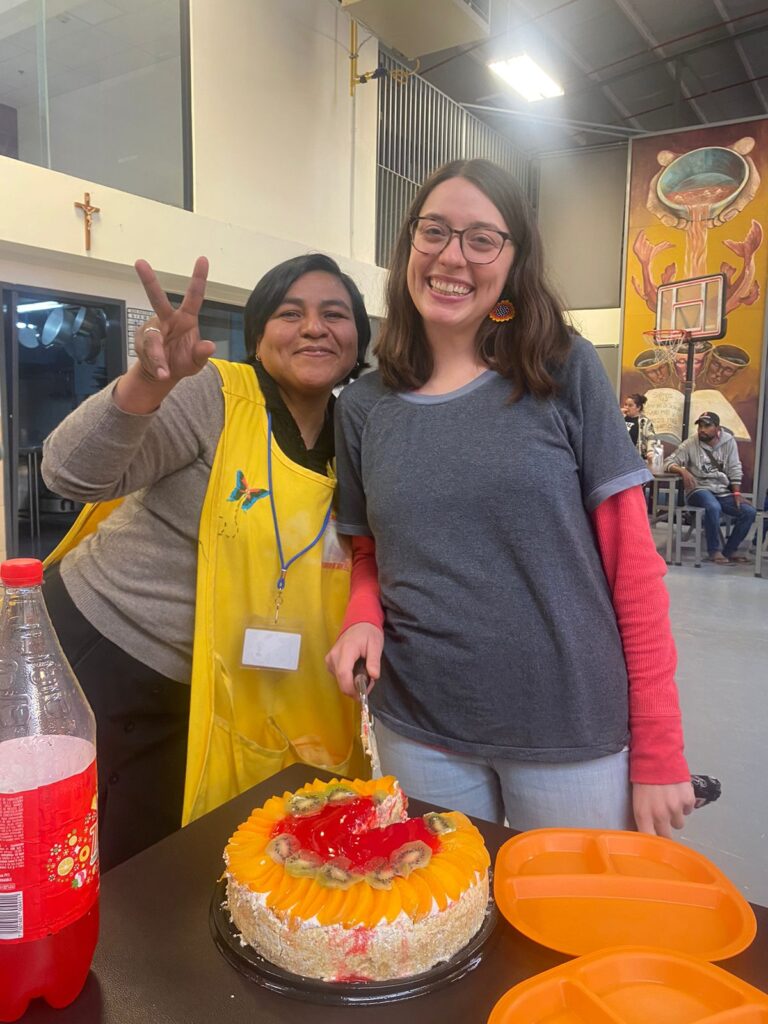
Mi parte favorita de estar en Kino fue poder presenciar y aprender sobre el corazón de su enfoque organizacional. Al principio pensé que el protocolo era lo que quería aprender, pero rápidamente me di cuenta de que los protocolos son situacionales, regionales y cambiantes. La misión y los valores subyacentes es lo que más me inspira. Lo que quiero, más que nada, son respuestas a las preguntas “¿qué futuro imaginamos para todos nosotros? ¿Qué tipo de comunidad, y mundo, queremos construir, y cómo lo haremos?”
Durante mi orientación, compartieron conmigo sus “prioridades estratégicas” en las que se están enfocando durante estos próximos 3 años como una organización en constante crecimiento y evolución. El acompañamiento integral de los migrantes es la primera prioridad, incluyendo la recreación, el cuidado espiritual, el empoderamiento y el acceso a los derechos. La siguiente es la integración de migrantes en los Estados Unidos, sustentando comunidades de acompañamiento mutuo y motivando y equipando socios educativos para recibir y acompañar a los migrantes. La siguiente prioridad es la hospitalidad local, que incluye la creación de redes y la hospitalidad, en Sonora, México, seguida de un cambio de políticas: crear voluntad política en los EE. UU. para promover políticas migratorias humanas, justas y viables a través de cambios en el sentimiento público, transformando comunidades indiferentes hacia la empatía. Su última prioridad explícita es la equidad y el bienestar: promover la dignidad, la equidad y el bienestar entre el personal y los voluntarios.
Todas las organizaciones que he visitado hasta ahora (Ajo Samaritans, Casa Alitas, Fronteras Compasivas, la Iniciativa Kino Para la Frontera) realmente están tratando de enfrentarse a la oscuridad con esperanza, ofrecer apoyo vital, y vivir los valores de amor, justicia, dignidad, y comunidad. Ninguna de estas organizaciones afirma estar haciendo todo, o resolviendo todos los problemas, o ayudando a todos. No sugieren tener todas las respuestas a la migración masiva de personas en todo el mundo. Ellos, como cualquier otra organización o colectivo orientado al servicio social, son capaces de discernir el valor de hacer algo, por pequeño o temporal que sea, a pesar de los muchos obstáculos y desafíos. De plantar semillas, de emprender el trabajo que les corresponde.
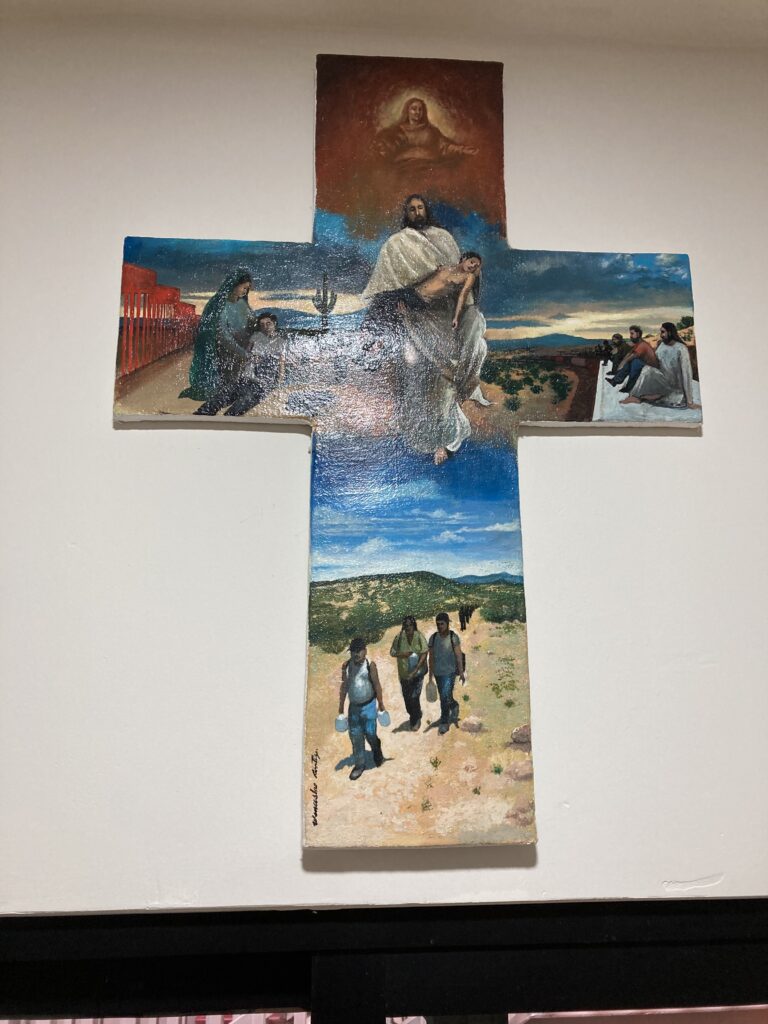
Creo que a veces hay un miedo a que te rompan el corazón que impide que las personas se comprometan con personas y comunidades que están experimentando un sufrimiento particularmente agudo (eso, mezclado con nuestro ensimismamiento que nos convence de que en realidad no tenemos tiempo ni energía o capacidad ;; El Jesuita Greg Boyle dice que las personas no somos egoístas, solo estamos absortos en nosotros mismos. Estamos distraídos por nosotros mismos, lo que nos impide ver a los demás). Cuando no nos criamos con la normalización del voluntariado, la ayuda mutua y la acción orientada a la comunidad, esas cosas se convierten en elecciones que solo hacen “gente realmente buena”, o “santos”, o personas con “gran corazón”, o personas que son “valientes”, pero no nosotros.
Y luego, debido a que todavía estamos viendo las noticias e yendo al centro de la ciudad y evitando viajar a ciertas áreas, no sabemos cómo involucrarnos en ningún problema de la comunidad; entonces gastamos nuestra energía, dinero y tiempo tratando de anestesiar el dolor y el miedo que surge naturalmente. Tratamos de recuperar el control de todos los aspectos de nuestras vidas, utilizando nuestras cámaras de seguridad, aplicaciones de planificación financiera y entrenamiento personal en el gimnasio, para contrarrestar la angustia de nuestro entorno incontrolable. Y cuanto más nos desconectamos del mundo que nos rodea, más nos hundimos en la apatía y la indiferencia. Y como dice Patrick Saint-Jean, S.J., en El Trabajo Espiritual de Justicia Racial,
“…cuando nos dejamos hundir en la apatía y la indiferencia, el fuego de nuestra imaginación se apaga. Ya no podemos vislumbrar la posibilidad de un mundo mejor. Algo dentro de nosotros está muerto”. (pág. 313)
Sospecho que la obsesión de mi cultura con la adquisición material y la promoción comercial y política de mejorar la eficiencia, la comodidad y el placer de nuestras vidas sin tener en cuenta a nuestros vecinos o el medio ambiente explicaría por qué tantos de nosotros estamos tratando de aumentar nuestras protecciones y participar menos aún con nuestras comunidades. Luego también tenemos la continuación del paternalismo supremacista blanco y el capitalismo explotador desenfrenado que eleva la caridad individual mientras aniquila cualquier intento de reforma estructural. Ninguno de nosotros es inmune a lo que hemos heredado de nuestros antepasados, lo bueno y lo malo, y los contextos sociales dentro de los cuales nos formamos como seres humanos.
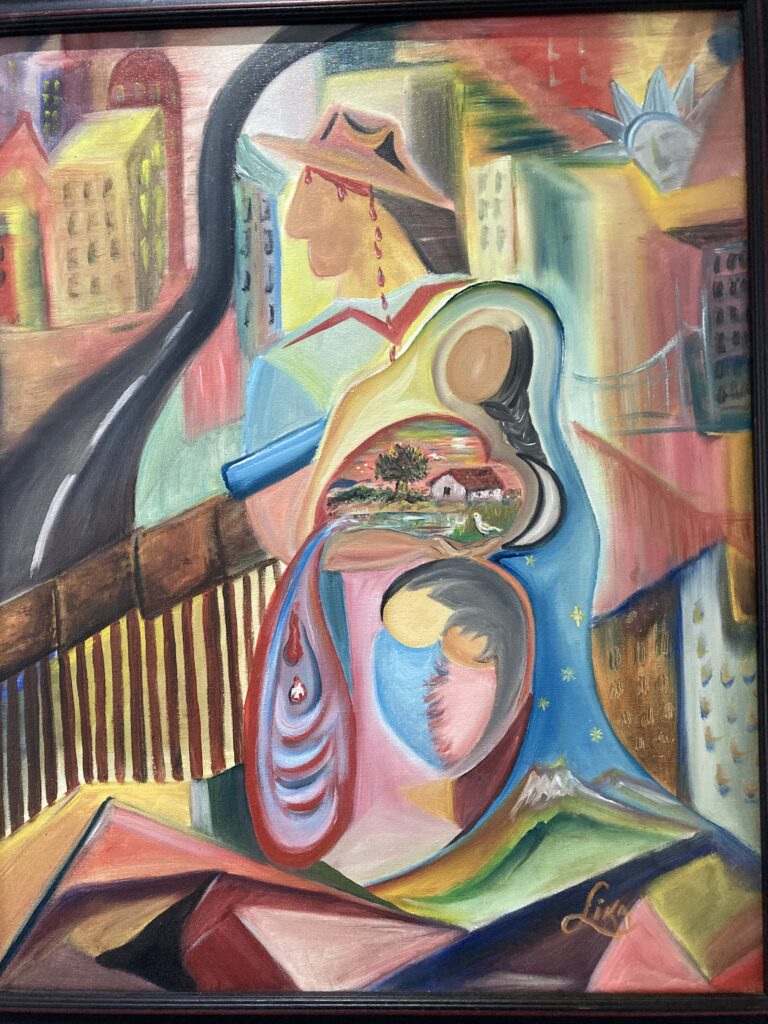
Y, sin embargo, todos estamos dotados de conciencia para discernir, fuera de una mentalidad de supervivencia, para tirar (o transformar) lo que no nos sirve y no servirá a la séptima generación que viene después de nosotros. Aquellos de nosotros que crecimos en un contexto cristiano o practicamos sabemos que durante este tiempo de Cuaresma, no nos estamos preparando espiritualmente para la Crucifixión. Nos estamos preparando para la Resurrección.
“La Resurrección es una llamada a imaginar. Nos desafía a ampliar nuestras perspectivas y descubrir el volumen completo de lo que Dios nos está llamando a ser y hacer. La imaginación alimenta la empatía, permitiéndonos explorar lo que significa sentir, ver y pensar como otra persona”. (Patrick Saint-Jean, S.J., El trabajo espiritual de la justicia racial)
Y entonces pido a Dios para que cada uno de nosotros pueda discernir nuestras propias prioridades estratégicas, como Kino, que explícitamente nos llaman a una relación más profunda con nosotros mismos, nuestros vecinos y nuestro hogar ecológico, usando nuestra imaginación para “re-crear nuestro mundo, permitiéndonos ser co-creadores con Dios.” ?<3
